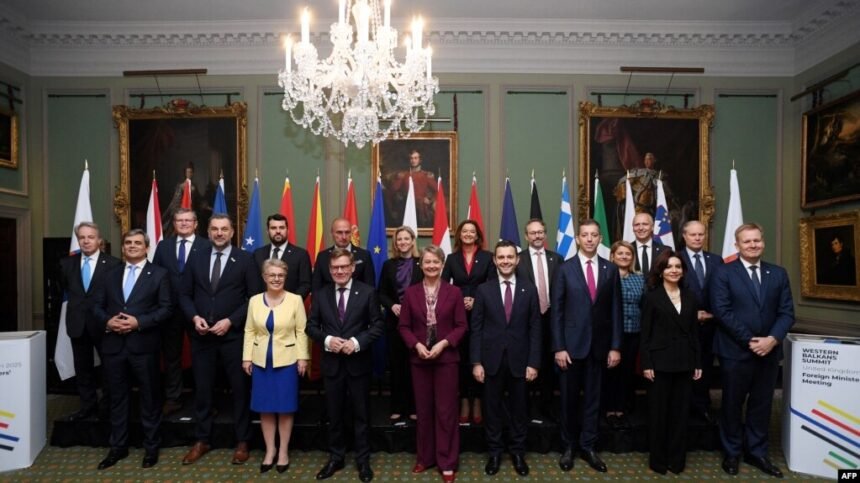The Berlin Process continues to support key reforms to bring the six Western Balkan countries closer to the European Union, though some of them increasingly feel left behind.
Belfast as a Symbol of Reconciliation
On a cloudy autumn day in Belfast, the historic Hillsborough Castle – the official residence of the British monarch in Northern Ireland – hosted a two-day summit with representatives from the Western Balkans. The choice of venue was deeply symbolic: the site of the 1998 Good Friday Agreement that ended decades of sectarian violence between Catholics and Protestants in Northern Ireland.
The United Kingdom, as the host, wanted to highlight reconciliation and peacebuilding, drawing a parallel between Northern Ireland’s past and the Western Balkans’ ongoing challenges.
A Renewed Push for EU Enlargement by 2029
At the opening of the summit, the UK Foreign Secretary emphasized that stability in the Western Balkans is directly linked to the security of Europe — and, by extension, the United Kingdom.
Germany’s Foreign Minister Johann Wadephul underlined the EU’s responsibility to offer a credible membership perspective to the region, calling for “a new momentum” in the accession process.
“People are beginning to lose faith in a European future,” he warned, but expressed optimism that by 2029, enlargement could regain pace. He also cautioned that further delays could lead to renewed hostilities and increased influence from Russia and China.
The Unfulfilled Promise of Thessaloniki
Twenty years ago, at the 2003 Thessaloniki Summit, the EU promised full membership to the Western Balkans after the violent breakup of Yugoslavia. Yet, only Slovenia and Croatia have since joined the Union. Others remain at different stages of accession talks, with Albania and Montenegro seen as the most advanced.
The Berlin Process: A Coalition of the Willing
Launched by Angela Merkel, the Berlin Process serves as a flexible, unofficial framework bringing together Western Balkan states (Albania, Bosnia and Herzegovina, Kosovo, Montenegro, North Macedonia, and Serbia) with selected EU members and the UK — described by experts as a “coalition of the willing.”
According to Frauke Seebass of the German Council on Foreign Relations (DGAP), this setup allows for greater flexibility, as it avoids the unanimity requirements that often stall EU decision-making.
Obstacles and Internal Challenges
The accession path remains blocked by bilateral disputes and domestic political problems. The decades-long name dispute between Greece and North Macedonia ended only in 2019 with the Prespa Agreement.
Yet, corruption, weak rule of law, and unresolved tensions — especially between Serbia and Kosovo — continue to hinder progress. Meanwhile, the mass emigration of young people fuels a serious brain drain, depriving the region of its most skilled citizens.
Russia and China Fill the Vacuum
The EU’s slow progress has opened the door for Moscow and Beijing.
“These powers exploit the vacuum left by a distracted EU and U.S.,” Seebass told DW. She noted that Serbia’s 2023 free trade deal with China contradicts its declared EU ambitions and warned about Belgrade’s close ties with Russian intelligence agencies and the issuance of Serbian passports to Russian nationals, enabling them to travel visa-free in the Schengen Zone.
Serbia’s heavy energy dependence on Russian gas and oil, coupled with its refusal to align with EU sanctions against Moscow, underscores Belgrade’s balancing act between East and West.
Security and Migration Take Center Stage
In Belfast, security topped the agenda. Around €5 million will be invested in projects to strengthen cyber defense and combat disinformation, while another €11.5 million will go toward curbing illegal migration along the Balkan route.
These may be small steps, but they aim to send a clear signal: Europe has not forgotten the Western Balkans.
The next major meeting of the Berlin Process will be held in London on October 22, where heads of state and government from participating countries will gather to continue discussions on integration, stability, and cooperation.







